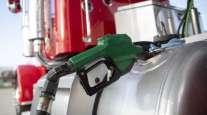Senior Reporter
ATA Commends Caucus’ User Fee Funding Approach

[Stay on top of transportation news: Get TTNews in your inbox.]
A U.S. House caucus’ legislative funding strategy that considers an increase to fuel taxes for infrastructure systems garnered praise from the country’s premier trucking association.
As Congress prepares to take up major transportation bills as early as this month, American Trucking Associations President Chris Spear said the 58-member bipartisan Problem Solvers Caucus’ infrastructure outline, especially its focus on user fees, merits consideration among policymakers and the White House.
“The proposal your caucus released not only offers realistic, concrete solutions to one of the most serious policy challenges facing our nation today, but it also marks a return of political courage in Washington by expressing what the majority of lawmakers on Capitol Hill know to be true but few are willing to say: User fees are the most practical and politically viable solution to our infrastructure funding woes, and modernizing the federal fuel user fee offers the greatest return on investment over the next decade as we develop a long-term funding mechanism suitable to an increasingly decarbonized economy,” Spear wrote to the caucus May 3.
ATA Letter Caucus.df by Transport Topics on Scribd
The ATA leader emphasized that infrastructure networks require funding predictability, noting taxpayer safeguards linked to the fuel user fee.
“As the leading payer into the nation’s Highway Trust Fund, trucks cover nearly half the entire user-fee tab while accounting for only 4% of vehicles on the road,” said Spear. “Our industry is proud to pay our fair share, and we’ll continue to, so long as policymakers maintain an equitable system that draws on the contributions of all who use and benefit from it.
“Although fuel expenses are one of the largest cost centers in our business, the trucking industry supports modest and phased increases in the fuel user-fee.”
Spear, however, pushed back on proposals that would exclusively target freight-centric operations.
“Other proposed funding mechanisms, including those that attempt to impose a sales tax on freight, are fraught with high administrative costs, highly susceptible to evasion and enjoy little support among the business community,” he said.
Last month, the Problem Solvers Caucus proposed improvements to “highways, roads and bridges, transit and railways, ports and airports, water and sewer systems, energy systems and the power grid, and broadband and communications networks” to realize infrastructure resilience and enhanced access to freight and passenger corridors.

Reps. Josh Gottheimer (left) and Brian Fitzpatrick
According to their proposal, consideration would be given to adjusting the federal fuel tax annually for inflation via the Consumer Price Index, the National Highway Construction Cost Index or the Corporate Average Fuel Economy (CAFE) standards. Other funding approaches the group presented include transitioning to a vehicle miles traveled (VMT) fee system, enhancing registration fees on electric and hybrid electric vehicles and possibly adopting a fee based on the value of certain freight to broaden an air cargo tax to trucking operations.
The caucus’ blueprint is meant as an option to President Joe Biden’s $2.25 trillion plan and Senate Republicans’ nearly $600 billion framework.
Rep. Josh Gottheimer (D-N.J.), co-chairman of the caucus, observed, “The survival of our country depends on bipartisan solutions, and bipartisan governing.”
Today, the Problem Solvers are releasing a new report of bipartisan policy recommendations to build a strong, successful 21st Century infrastructure network for America.
Read the report here: https://t.co/UKewrCTqBA pic.twitter.com/RIi985hKXI — Problem Solvers Caucus (@ProbSolveCaucus) April 23, 2021
Rep. Brian Fitzpatrick (R-Pa.), caucus co-chairman, added: “Infrastructure investment can and will deliver real benefits to every American and additionally, has the unique power to unite us as a nation.”
Over the years, ATA has proposed adopting a fund that would rely on a 20-cents-per-gallon fee on motor fuels collected at the wholesale rack. The federal tax of 18.4 cents per gallon for gasoline and 24.4 cents per gallon for diesel was set 1993. The Highway Trust Fund account is backed by revenue from federal fuel taxes. The account is used to assist states with transportation projects.
Want more news? Listen to today's daily briefing below or go here for more info:




